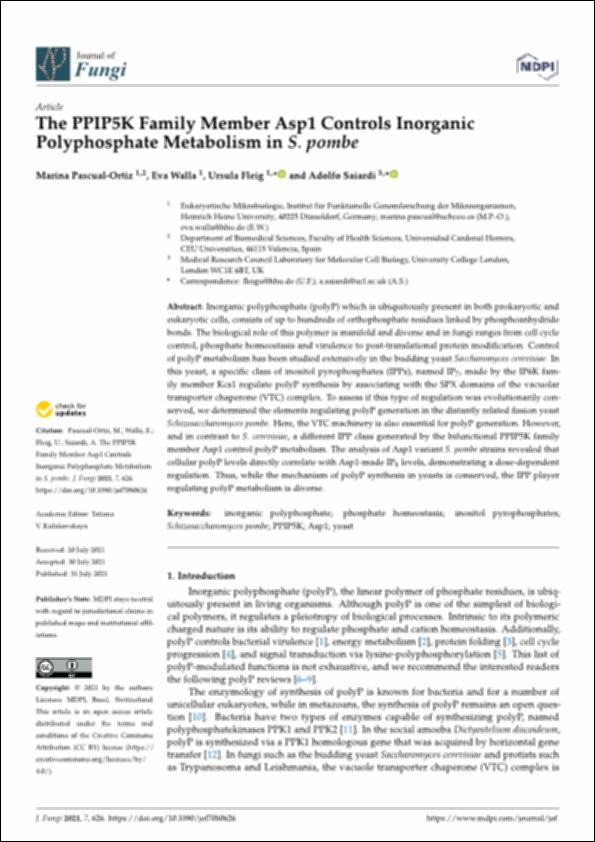Please use this identifier to cite or link to this item:
http://hdl.handle.net/10637/13674The PPIP5K family member Asp1 controls inorganic polyphosphate metabolism in "S. pombe"
| Title: | The PPIP5K family member Asp1 controls inorganic polyphosphate metabolism in "S. pombe" |
| Authors : | Pascual Ortiz, Marina Walla, Eva Fleig, Ursula Saiardi, Adolfo |
| Keywords: | Yeast.; Schizosaccharomyces pombe - Aspectos bioquímicos.; Schizosaccharomyces pombe - Biochemical aspects.; Homeostasis.; Fosfatos - Metabolismo.; Phosphates - Metabolism.; Levaduras. |
| Publisher: | MDPI |
| Citation: | Pascual-Ortiz, M., Walla, E., Fleig, U. & Saiardi, A. (2021). The PPIP5K family member Asp1 controls inorganic polyphosphate metabolism in "S. pombe". Journal of Fungi, vol. 7, i. 8 (31 jul.),art. 626. DOI: https://doi.org/10.3390/jof7080626 |
| Abstract: | Inorganic polyphosphate (polyP) which is ubiquitously present in both prokaryotic and eukaryotic cells, consists of up to hundreds of orthophosphate residues linked by phosphoanhydride bonds. The biological role of this polymer is manifold and diverse and in fungi ranges from cell cycle control, phosphate homeostasis and virulence to post-translational protein modification. Control of polyP metabolism has been studied extensively in the budding yeast Saccharomyces cerevisiae. In this yeast, a specific class of inositol pyrophosphates (IPPs), named IP7, made by the IP6K family member Kcs1 regulate polyP synthesis by associating with the SPX domains of the vacuolar transporter chaperone (VTC) complex. To assess if this type of regulation was evolutionarily conserved, we determined the elements regulating polyP generation in the distantly related fission yeast Schizosaccharomyces pombe. Here, the VTC machinery is also essential for polyP generation. However, and in contrast to S. cerevisiae, a different IPP class generated by the bifunctional PPIP5K family member Asp1 control polyP metabolism. The analysis of Asp1 variant S. pombe strains revealed that cellular polyP levels directly correlate with Asp1-made IP8 levels, demonstrating a dose-dependent regulation. Thus, while the mechanism of polyP synthesis in yeasts is conserved, the IPP player regulating polyP metabolism is diverse. |
| Description: | Este artículo se encuentra disponible en la siguiente URL: https://www.mdpi.com/2309-608X/7/8/626 Este artículo pertenece al número especial "Inorganic Polyphosphate Metabolism in Yeasts". |
| URI: | http://hdl.handle.net/10637/13674 |
| Rights : | http://creativecommons.org/licenses/by/4.0/deed.es |
| ISSN: | 2309-608X (Electrónico) |
| Issue Date: | 31-Jul-2021 |
| Center : | Universidad Cardenal Herrera-CEU |
| Appears in Collections: | Dpto. Ciencias Biomédicas |
Items in DSpace are protected by copyright, with all rights reserved, unless otherwise indicated.


